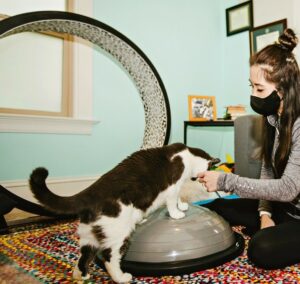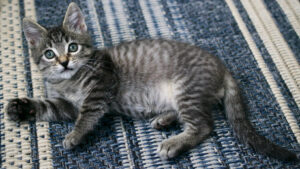— Guest post by Dr. Natasha Bui, PT, DPT, CCRT, Amicus Animal Rehabilitation
As we all know, cats are notoriously great at being discrete and secretive! And unfortunately for us, that includes hiding symptoms of pain or discomfort.

Through the years of caring for my own cats, as well as working as an animal physical therapist to help cats with varying types of injuries and conditions, I’ve learned more and more about feline body language and other cues. And I’ve also seen how crucial it is to catch these signs early on.
Most cats actually do show symptoms of pain early on, albeit signs that are very subtle and inconsistent. Sometimes these symptoms resolve somewhat, or they might remain subtle and/or intermittent until the pain worsens and progresses. Unfortunately, when the signs of discomfort finally become consistent and noticeable to owners, it’s often at the point where that pain has become chronic and progressed to a significant level. But there are things you can look for now!
As an animal physical therapist, one of my goals is to help my fellow cat parents learn to spot distress signals early. When you notice your cat’s pain quickly, you’ll have a better chance at fully resolving it, as well as preventing your sweet kitty from progressing to the point of no return! 🐾
Here are signs that your feline may be experiencing pain or discomfort:
- Vocalizations
- Limping
- Holding up the same limb or paw consistently
- Decreased time spent standing on a specific limb/paw
- Trembling or shaking (constant or intermittent)
- Hiding more than usual
- Decrease in affection
- Avoiding their favorite spots, especially if spots are higher up
- Accidents near or outside of their litter box
- Decreased appetite and/or weight loss
- Increased lethargy or time spent sleeping
- Reluctance to play
- Stiffness or maintaining a rounded/hunched spine
- Hesitancy, needing multiple attempts, and/or missing jumps altogether
- Sudden favoring or lying primarily on one specific side
- Difficulty or cessation of getting into full loaf position (aka all four limbs tucked under and spine is positioned midline)
- The same limb or paw sticking out
- Limb(s) outstretched to side
- Immediately rolling onto and lying to one side
- Reactivity or sensitivity to being touched in specific spots (common areas include: low back, spine, hips, wrists)
- Changes in their gait or how they walk:
- Head bobbing up and down
- Widened stance, usually through their back limbs
- Stiffness through limbs (i.e. keeping limbs straight or maintaining a crouch or bend in their limbs)
- Tail positioned towards or swings consistently more to one side
- Sudden onset/increase in purring, especially if your kitty doesn’t typically pur
- Meatloaf position (similar to loaf position, however this is not a relaxed position. Cats will typically have a rounded spine, leaning forward, bearing weight through their front paws, and head may or may not be looking down at the ground). However, this is not an absolute and can sometimes be normal and asymptomatic
These signs and symptoms might only show up one at a time or you may see a combination. It is important to note that without a full examination, it is hard to distinguish between a medical condition versus an orthopedic one.
It’s imperative to try to address any symptoms promptly, and to figure out the primary cause so you can work to resolve it correctly! If your cat is displaying any of the signs and symptoms listed above, please refer to your feline health team, such as your primary veterinarian, an animal rehabilitation-certified veterinarian, and/or an animal physical therapist.
About Amicus Animal Rehabilitation
Amicus Animal Rehabilitation provides evidence-based physical therapy and customized rehabilitation programs to help your best friend, whether feline or canine, achieve the highest function & quality of life possible. To learn more, visit amicusrehab.com.




